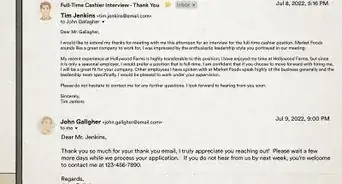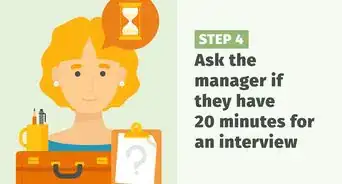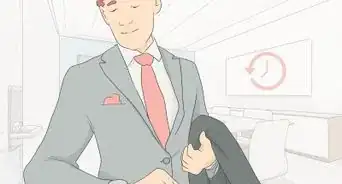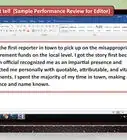This article was co-authored by Devin Jones and by wikiHow staff writer, Christopher M. Osborne, PhD. Devin Jones is the creator of “The Soul Career," an online career incubator for women. She is certified in the CliftonStrengths assessment and works with women to clarify their purpose and create meaningful careers. Devin received her BA from Stanford University in 2013.
There are 11 references cited in this article, which can be found at the bottom of the page.
wikiHow marks an article as reader-approved once it receives enough positive feedback. In this case, 100% of readers who voted found the article helpful, earning it our reader-approved status.
This article has been viewed 812,773 times.
If you’ve sat through more than a handful of interviews in your life, you’ve surely faced the following question: “What is your greatest weakness?” It’s a very common interview question because it reveals quite a bit about your self-awareness, and a tough one to answer because there are no "great" responses. Before tackling this question in an interview or in any other setting, it’s essential that you take the time to identify and clarify your weaknesses to yourself. Then, work on pairing your weakness with an explanation on how you’re working to improve upon it.
Steps
Accepting Your Weaknesses
-
1Show enough self-awareness to accept your imperfections. You are not perfect. You have weaknesses. The more able and willing you are to accept this, the more capable you’ll be of maximizing the abilities you do possess. When a job interviewer or anyone else asks you to describe your weaknesses, they nearly always want to see that you are self-aware and mature enough to know you have them.[1]
- If your answer is “I don’t have any weaknesses," then it’s obvious that one of your primary weaknesses is a lack of self-awareness.
- Being aware of your weaknesses is not the same as being weak. Knowing about and compensating for your weakness is in fact a very important strength.
-
2Identify and write down your specific weaknesses. You can’t communicate your weaknesses effectively if you don’t know what they are. While it’s no fun to focus on your weaknesses, take the time to actually figure them out and write them down for your own benefit.[2]
- Look back at times you’ve failed or come up short, and really think about why. Were you too passive? Too bossy? Unprepared? Overextended?
- For this exercise, write down your weaknesses in very simple and direct terms: “I get distracted too easily.” “I focus too much on small details.”
Advertisement -
3Get input on your weaknesses from outside sources as well. Ask trusted friends, advisors, and mentors for honest feedback on your weaknesses. Tell them to be completely honest, because it's important for you to get clear and accurate information from them.[3]
- Say something like: "I know it's a bit awkward, but it would really be helpful if you'd tell me some of my weaknesses, based on your own observations. I promise I won't get upset!"
- Also consider taking personality evaluations to reveal weaknesses. Skip personality quizzes in popular magazines and use evaluations by reputable mental health organizations.
-
4Repeat your weakness evaluation several times per year. Your actual weaknesses will likely change over time, and your understanding of them certainly will. Every 3-6 months or so, and more often during job hunts, take the time to repeat your effort to identify and write down your weaknesses.[4]
- It’s a good idea to evaluate your strengths at the same time, especially since job interviewers often ask about both weaknesses and strengths.
-
5Be honest with yourself and to others. Don’t try to convince yourself that you’re a perfectionist if you’re not, and definitely don’t tell someone that you are. Take ownership of your weaknesses, and be truthful to yourself and others about them. They’ll respect your self-awareness, self-confidence, and honesty.[5]
- However, this doesn’t mean you shouldn’t “massage the truth” a little to put your best foot forward during a job interview. Don’t say, “I’m lazy,” say, “I sometimes struggle with motivation when I’m not given a clear goal.”
Answering in an Interview
-
1Be clear and concise with your response. Don’t try to ignore the question, change the subject, or ramble on without really saying anything. The interviewer is looking for something very specific in this question—namely, your self-awareness and capacity for self-improvement.[6]
- It should never come as a surprise to be asked “What is your greatest weakness?”, and you should never respond like it’s a surprise. Enter every interview expecting to be asked this question—and practice your answer ahead of time!
-
2Name an actual weakness, not an excessive strength. Twisting your answer in an attempt to make your weakness into a poorly-disguised strength will always fail. Saying “I care too much” or “I try too hard” can actually indicate a weakness, but phrasing them that way makes it seem like you lack self-awareness, humility, or both. Instead of trying to say that you have too much of a particular strength, describe an actual weakness that you are working on.[7]
- For instance, instead of saying, “My greatest weakness is that I’m too much of a perfectionist," try something like, “I sometimes over-analyze my work products, which can cause me to fall behind in other tasks.”
-
3Skip attempts to justify the weakness you've named. Don't try to blame it on your parents, or bad luck, or something else out of your control. Take ownership of the weakness, without delving into what factors have caused it.[8]
- The interviewer isn't looking for a deep analysis of the roots of your weaknesses. Instead, they want to see that you're aware of your weaknesses and trying to address them.
-
4Offer evidence that you’re working toward improvement. You’ve started your answer by identifying your weakness concisely and in a way that shows good self-awareness. Immediately follow up by explaining to the interviewer what you are doing to address this weakness.[9]
- For example: “I sometimes over-analyze my work products, which can cause me to fall behind in other tasks. To avoid that, I set aside a specific amount of time for review. When that time is up, I move to the next task on my list of priorities.” You've now proven that you can not only identify your weaknesses, but develop useful methods to overcome them.
-
5Don’t try to repeat, restate, or move past your answer. After you answer the question, stop talking. Wait for the interviewer to speak next. You’re done. You’ve given them what they asked for, so wait for a response. Be patient and allow them to make the next move.[10]
- The interviewer might purposely insert a lengthy pause to see what you’ll do. Look them in the eye with a comfortable expression on your face and wait for them to give you feedback.
- Resist the urge to take their silence as evidence that you’ve messed up the answer and should try again. If they want you to give another weakness, they’ll ask for it!
-
6Have multiple weaknesses ready in case the interviewer delves deeper. You should have three weaknesses and compensatory techniques at your fingertips. The interviewer may ask you the same question a second time, and possibly a third time. Some interviewers really love exploring your weaknesses![11]
- If you get asked a fourth time, there’s a good way to handle that: “When I do this exercise, maybe once a quarter or so, the list might change from time to time. I limit my focus to three current weaknesses so I don’t become overwhelmed. If you ask me again in June, I might have a different answer for you then.”
- Or, if you’re sure that a little humor will work: “My fourth weakness is that I can only keep track of three major weaknesses at once!”
EXPERT TIPDevin Jones is the creator of “The Soul Career," an online career incubator for women. She is certified in the CliftonStrengths assessment and works with women to clarify their purpose and create meaningful careers. Devin received her BA from Stanford University in 2013.Career Coach
 Devin Jones
Devin Jones
Career Coach"I always say own the weakness," adds Strengths Coach Devin Jones. "Period. Full stop. Don't justify it. Own it. Then talk about how you know that it affects others and what you're doing to improve that."
Scripting Common Weaknesses
-
1Explain your efforts to take the initiative more often. Employers generally like people who take the initiative. For one, they don't have to worry about you just sitting back and waiting for tasks to be given to you. Second, it means that you're constantly thinking about how you can add value to the company. Here’s how you might approach this weakness:[12]
- “I don't take the initiative as much as I'd like. My last job was one in which following orders was very important and improvising was frowned upon. I realized that I gradually shied away from doing things independently for fear of upsetting my boss or undercutting company policy. Moving forward, I realize that most positions, and especially this one, value a degree of initiative. I try to be absolutely clear about the expectations of the project before I start working so that I can attack different angles or follow different leads while still staying on track.”
-
2Describe how you’ll manage your time more effectively. Good time management is something all potential employers seek in interviewees. They're looking for someone who can do the most amount of quality work in the least amount of time. You really want to hit this answer out of the park if you choose it, to separate yourself from the rest of the pack:[13]
- “I don't always manage my time effectively. To tell you the truth, sometimes I get sucked down a rabbit hole and neglect to balance all the other responsibilities of my job. I'm compulsive about getting things right the first time, sometimes at the expense of other tasks. That said, I'm learning how to get better at tying one project up when it looks like I'll fall behind on another, without using shortcuts or mailing in it. I'm planning ahead, asking appropriate channels for help when necessary, and finding more efficient yet equally effective ways of getting the job done.”
-
3Tell them you’re a leader but don’t always need to lead. Trying to assume a leadership role when it’s not warranted is the opposite weakness of failing to take the initiative. Employers might be nervous about you stepping on your bosses’ toes. Instead, assure them that you are learning to be a role-player when needed:
- “I tend to seize a leadership role when it's not designated to me. Sometimes, this causes tension between me and the project lead, who understandably is trying to do his or her job. I'm learning how to trust people with their own responsibilities, though, because I realize that letting people do their designated jobs makes a team a lot more successful in the long run. I'm focused on becoming a better team player by letting everyone do his or her own job, and helping when necessary.”
-
4Let them know that your talkative nature won’t interfere with your job. Depending on the job, “I talk too much” may be hard to define as a weakness. Even in jobs that require an extroverted employee, though, the boss will want someone who is focused on work, not on telling jokes or learning about each and every coworker's weekend. Reassure them you're prioritizing the right kind of communication:
- “I talk too much. I'm a very extroverted, sociable person, which means that I have a weakness for not-always-workplace-related interactions. I'm getting better at channeling that extroversion into the right kind of communication. I'm leaving weekend updates for happy hour, and learning how to listen first and speak second, instead of the other way around. I know that I can sometimes drown other voices out, so I'm proactively asking colleagues to cut me off if I go off-topic or start dominating the conversation.”
-
5Show how you’re working on your fear of public speaking. This one is kind of a "spin" response, especially if you won’t be expected to speak in front of large audiences. But this response could actually be a sympathetic weakness: some interviewers may have a soft spot for verbal fumblers. Again, focus on drawing out some positive aspect of your phobia if you plan on using this weakness:[14]
- “I'm not great at public speaking. I start sweating, fumble my words, and can't seem to communicate the ideas I'm actively thinking about. However, I understand that being in a group setting is an integral part of this position, and although I'm not perfect at it yet, I feel like I'm improving. I joined a hobbyist's debate club to improve my exposure to larger crowds. I'm forcing myself to speak up in smaller groups, focusing less on my ego and whether I "did well," and more on what I communicated and I how I communicated it.”
-
6Clarify that you’re working on getting better organized. If you're interviewing for a position that requires great organizational skills—like being an office assistant—think twice about giving this response. On the other hand, many professions, especially "ideas" professions, don't rely on expert organization to get the job done. In any case, make it clear that you’re aware of the weakness and addressing it:[15]
- “I'm not as organized as I could be. In college, I got by because I could keep my schedule in my head, and I could afford to be wrong once or twice along the way. Moving forward, I know that simple disorganization can produce errors or miscommunications that are unacceptable. I've taken to writing down every contact, meeting, and project goal in an online itinerary that I can access anywhere and anytime. I've gotten a lot more scrupulous about organizing the things that make my job possible and filing away the ones that don't.”
How Do I Identify My Weaknesses?
Community Q&A
-
QuestionWhat are some weaknesses to be answered in the interview?
 Tombstone KarenCommunity AnswerBring up only one weakness, but then turn it into a strength. For instance, if you're applying for a position that requires interaction with people, you can say "I'm a little introverted, but I work on that by getting involved on wikiHow and answering other's questions with information that I feel confident about."
Tombstone KarenCommunity AnswerBring up only one weakness, but then turn it into a strength. For instance, if you're applying for a position that requires interaction with people, you can say "I'm a little introverted, but I work on that by getting involved on wikiHow and answering other's questions with information that I feel confident about."
Warnings
- Don’t ignore things you don't know how to fix. Just because you have a weakness and don’t know what to do about it doesn’t mean you should pretend it doesn’t exist. Write it down and start thinking about it. However, you might not want to elaborate on that in an interview until you’ve developed a compensatory technique for it.⧼thumbs_response⧽
References
- ↑ https://www.fastcompany.com/3026105/the-importance-of-finding-and-facing-your-weaknesses
- ↑ https://www.forbes.com/sites/forbescoachescouncil/2018/01/22/best-tests-to-help-you-understand-your-strengths-and-weaknesses/#2f18d281495a
- ↑ https://www.forbes.com/sites/forbescoachescouncil/2018/01/22/best-tests-to-help-you-understand-your-strengths-and-weaknesses/#2f18d281495a
- ↑ https://www.forbes.com/sites/forbescoachescouncil/2018/01/22/best-tests-to-help-you-understand-your-strengths-and-weaknesses/#2f18d281495a
- ↑ https://www.forbes.com/sites/jacquelynsmith/2013/02/19/how-to-talk-about-your-biggest-weakness-in-a-job-interview/#70f94a575a80
- ↑ https://www.themuse.com/advice/5-strategies-thatll-stop-you-from-rambling-your-way-through-an-interview
- ↑ https://www.indeed.com/career-advice/interviewing/list-of-example-weaknesses-for-interviewing
- ↑ https://www.indeed.com/career-advice/interviewing/list-of-example-weaknesses-for-interviewing
- ↑ https://www.indeed.com/career-advice/interviewing/interview-question-what-are-your-strengths-and-weaknesses
- ↑ https://www.forbes.com/sites/jacquelynsmith/2013/02/19/how-to-talk-about-your-biggest-weakness-in-a-job-interview/#70f94a575a80
- ↑ https://medium.com/s/story/how-to-talk-about-your-weaknesses-5553824266e9
- ↑ https://www.fastcompany.com/3037092/9-ways-to-take-more-initiative-at-work
- ↑ https://targetjobs.co.uk/careers-advice/interview-questions/320311-how-do-you-manage-your-time-and-prioritise-tasks-tricky-graduate-interview
- ↑ https://corporatefinanceinstitute.com/resources/careers/interviews/public-speaking-weakness/
- ↑ https://www.businessinsider.com/5-weaknesses-to-tell-your-interviewer-about-2014-3
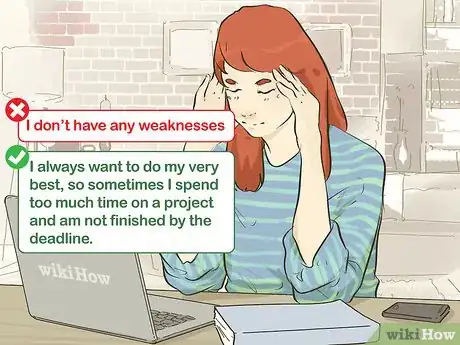
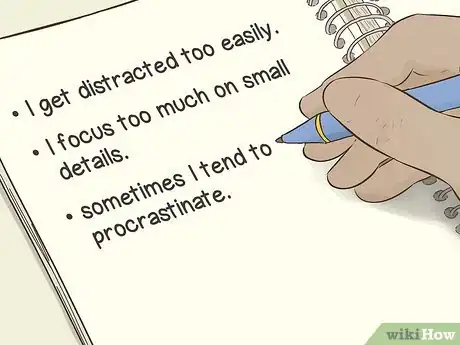
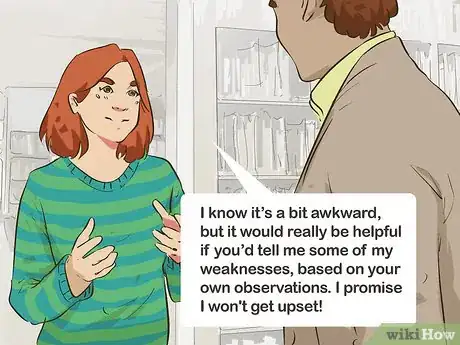
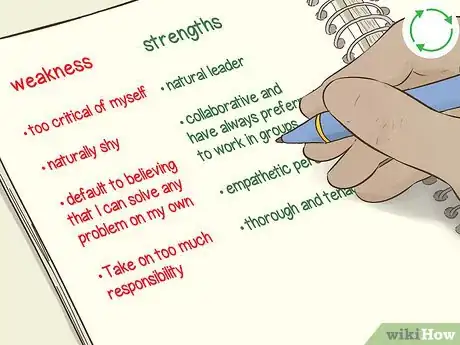
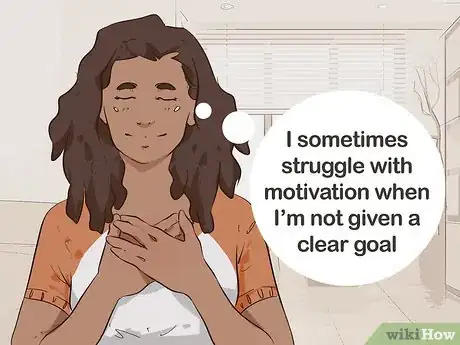
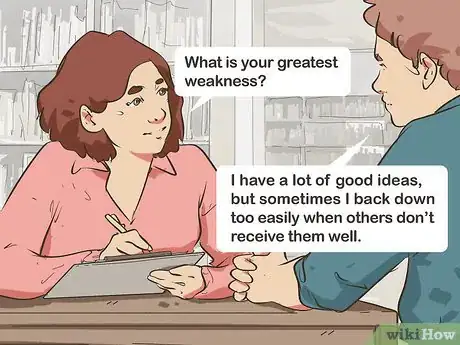
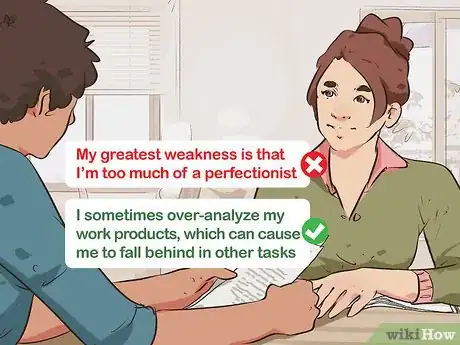
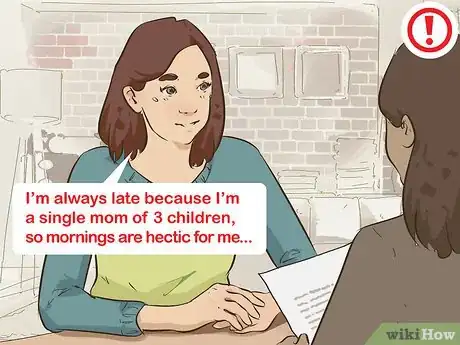
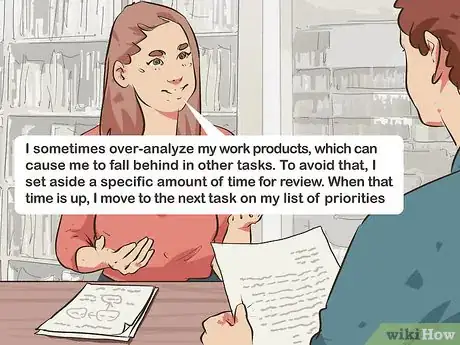
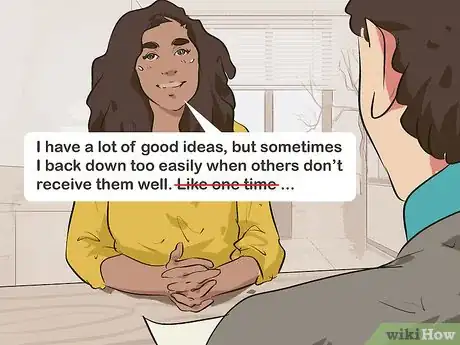
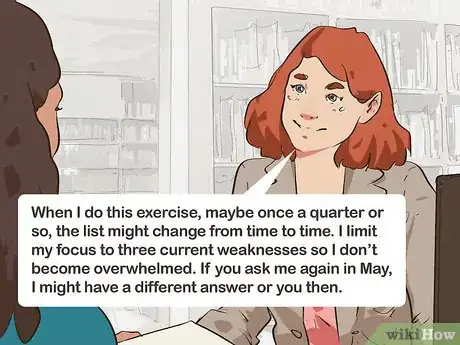
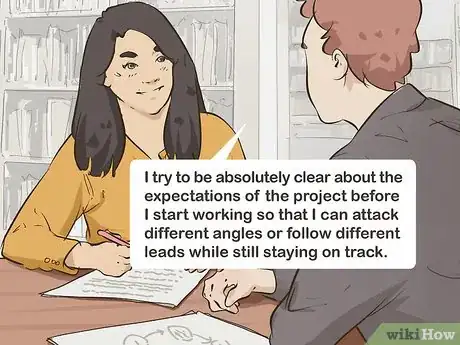
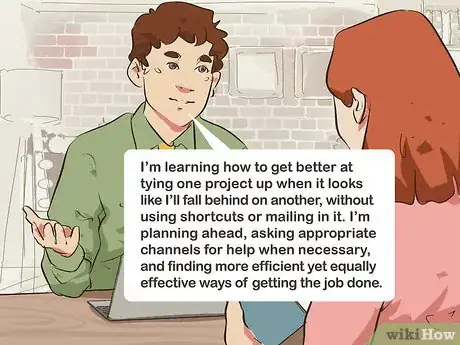
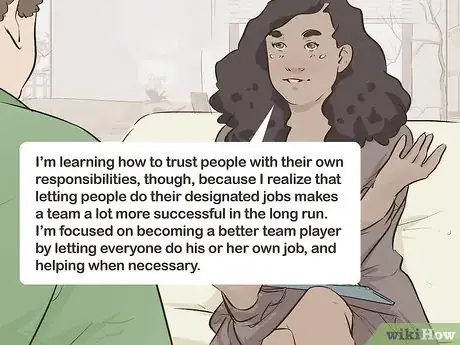
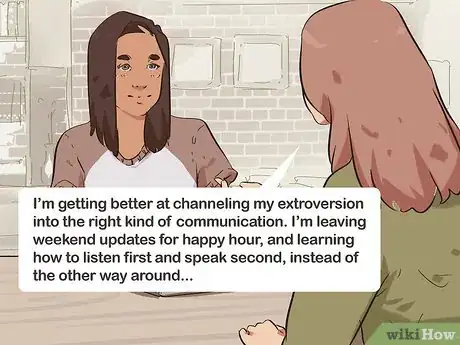
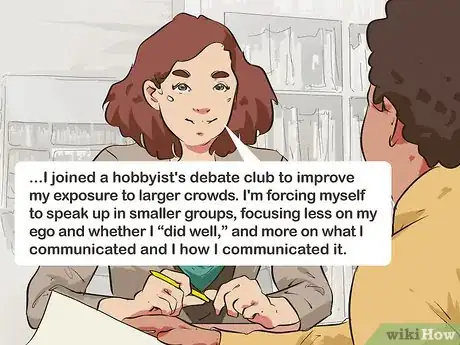
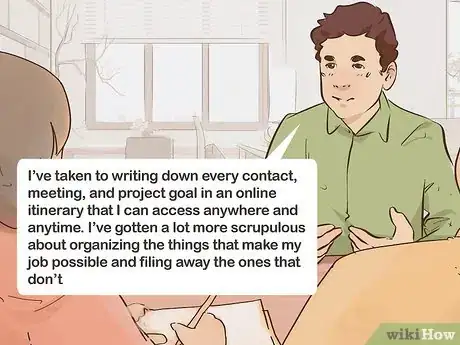
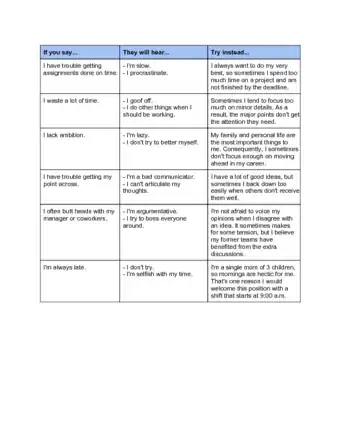
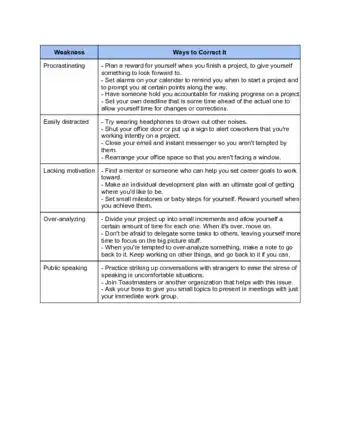


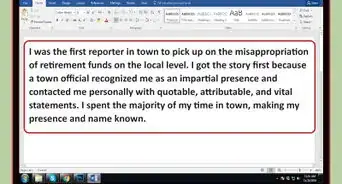
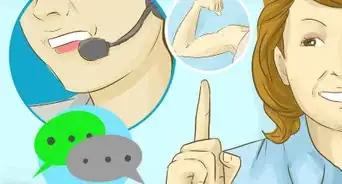
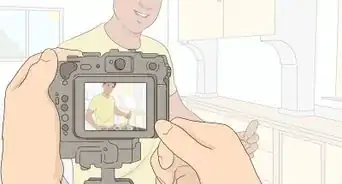

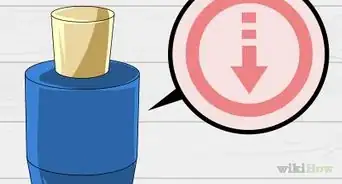
-Step-5-Version-4.webp)

